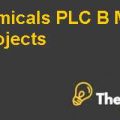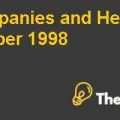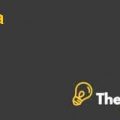Analysis of m & m pizza proposal Case Study Solution
M &M Pizza Company is about to implement a proposed change in its financial statements. The new Managing Director Moe Miller is considering to recapitalize by issuing a new debt of $500million and repurchasing the shares by the amount raised by issuing debt. This plan would have both positive and negative impacts on the financial statements and dividend per share.
The gearing ratio of the company (using the formula debt/debt equity) is 0% before the implementation of proposal whereas if the proposal is implemented then the gearing ratio (using the formula debt/debt equity) will be 50%. The gearing will rise to 50% of the total equity in the company and hence this will lead to interest payments for the company and this will lead to a sharp increase in total income/earnings of the shareholders.
The gearing ratio of the company (using the formula debt/equity) is 100% before implementation of the proposal of Moe Miller. The total capital is comprised of equity with no debt. Whereas after the implementation of the proposal the gearing ratio of the company (using the formula debt/equity) will be 50%.It will now comprise of half of the equity and half in total capital will be of debt.
The earning per share is the representative of the earnings available to the ordinary shareholders after the preference dividends have been paid. This earning is the amount available to the ordinary shareholder and can be distributed to them. The earning per share before the implementation of the proposal is $2 per share this shows that if the net income is distributed then every shareholder will get $2 of earnings. Whereas after the implementation of the proposal of recapitalization the earning per share will grow to $2.47 approximately and this is because of the fact that the total earning will remain same but the number of shares will decrease and this will lead to every shareholder getting $2.47 in case if the company goes into liquidation.
The dividend per share of the company is $2 and it will also grow to $2.94 after the implementation of the recapitalization process. The Eps and dividend per share is almost same due to the reason that there is no preference shareholder so there is no preference dividend which is deducted in the calculation of the earning per share. The dividend per share represents the dividend given to every shareholder. The dividend per share will improve if the proposal is carried out and it will be beneficial for shareholders if the proposal is carried out.
Currently,the interest cover of the company is zero because there is no debt in the balance sheet of the company and currently the company is 100% equity financed but after the implementation of the proposal, the interest cover will be 6.25 times. This shows that the interest is 6.25 times of the company’s profit (net income).
The dividend cover of the company is constant and is 1 time of the company’s profit. The company pays its whole net income as dividends to the shareholder and dividend cover shows that how much times is the dividend of the net income/profit of the company. The dividend cover will remain intact whether the proposal is carried out or not.
The dividend payout ratio of the company is also 1 times of the profit of the company, the dividend covers and dividend payout ratio is the same because the dividend payout ratio is the inverse of the dividend cover. The dividend cover will not be affected by the recapitalization proposal.
The P/E ratio of the company shows that how much times is the market price of the share if it is compared to company’s earnings. M & M Pizza has a P/E ratio of 12.5 times before implementation of the proposal and 8.5 times after implementation of the proposal. Before recapitalization, the P/E ratio is 12.5 which means that the market price of a share is 12.5 times of its earnings per share. See Exhibit 1-2
Impact on WACCof the new proposal of share repurchase:
The Wacc of the company (M & M pizza) is 8% in the current capital structure of the company as there is no debt and debt is a cheaper source of finance. As the company did not have any debt in its previous capital structure so the WACCwas 8%. Whereas if the company’s structure changes as previously the company was equity financed only and in the new proposal the company has both debt and equity in its capital structure, an increase in debt will increase gearing the company and hence the increase in risk level will alter the betas. The only way to get the WACCis to get the Beta asset of the company then using the Beta asset to find the Beta equity,in the end using the Beta equity to find theWACC of the company. On the other hand, as Debt is acheaper source of finance so after the issue of debt the company’s WACC decreased from 8% to 6.46%.This is due to the fact that the company issued debt and repurchased the shares with the help of the debt amount raised. This led to the gearing ratio being 50% of the total capital in the company using the formula of debt/equity. This will also lead to an increase in the market value of the company as WACChas an inverse relationship with the market value of the company and if one rises then the other will decrease and vice versa........................
This is just a sample partial work. Please place the order on the website to get your own originally done case solution.













